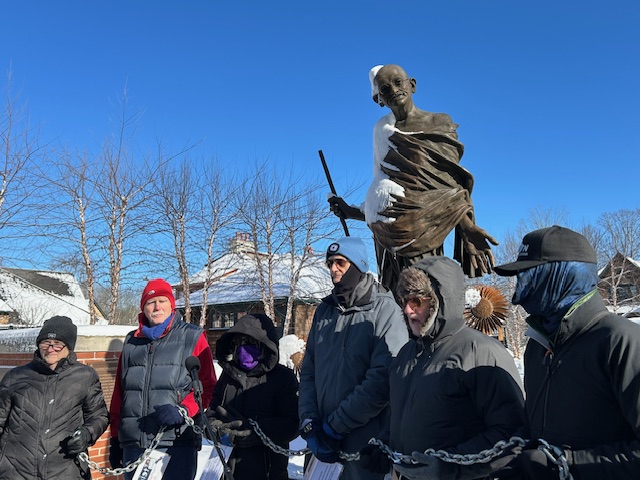Peace chain activists in Sherborn, MA, participate in civil disobedience protesting fascism on Inauguration Day, January 20, 2025. Their day in court is scheduled for May 6. Photo courtesy Lewis Randa
To effectively engage in resistance within the U.S. political system, it is essential to address all three branches of government: executive, legislative, and judicial. Each branch offers unique opportunities to express opposition, foster change, and strengthen democracy.
Executive Branch
Activism targeting the President (Commander in Chief) includes supporting or opposing candidates, donating to campaigns, voting in primaries and elections, protesting executive actions, and advocating for or against executive orders. Public demonstrations such as protests, rallies, vigils, and petitions can highlight critical issues like unconstitutional actions or threats to democratic institutions. The scope of potential actions is vast, so prioritize battles that align with your values. Leverage your network for greater impact; collaboration amplifies your voice.
Legislative Branch
Engaging with the legislative branch involves campaigning for or against representatives and senators, voting in congressional primaries and elections, contributing to campaigns, and advocating for specific legislation. Writing letters, signing petitions, and making calls are effective ways to ensure your voice contributes to shaping policies that matter to you.
Remember: elected officials work for the public. It is our civic duty to hold them accountable and demand they represent our interests.
Judicial Branch
While direct influence over judges and courts is limited, nonviolent civil disobedience provides a powerful way to engage the judicial system from within. Actions such as peace chain blockades or sit-ins lead to arrests or issuance of citations for disturbing the peace and court appearances, which are opportunities to highlight grievances and injustices within a legal framework.
Peaceful civil disobedience serves as a powerful — though controversial — means of challenging unjust laws and voicing opposition to unconstitutional executive orders and legislation. It often garners more media attention than traditional protests and, when employed creatively, can inspire others to take action. However, this form of activism demands personal sacrifice and a clear understanding of the potential risks involved.
Historical figures like Gandhi and Martin Luther King Jr. legitimized civil disobedience as a form of civic engagement. Be aware that outcomes may vary depending on political climates; don’t assume courts in blue states will be more lenient. Prepare for potential consequences while ensuring your actions are deliberate and meaningful.
Key Principles Of Civil Disobedience
Nonviolence: Avoid causing harm or infringing on others’ rights; violence undermines moral authority.
Deliberation: Plan actions carefully with clear goals while minimizing excessive disruption.
Acceptance of Consequences: Be willing to accept legal penalties as a demonstration of respect for the rule of law while exposing injustice.
When appropriate, invoke the necessity defense to position yourself, as a protester turned defendant, in a morally justifiable stance. The necessity defense asserts that an otherwise criminal act was justified because it was the only viable way to prevent a greater harm. As an affirmative defense, it acknowledges the act but argues that the circumstances made it necessary.
Proportionality in Activism
When considering your role in activism, think about proportionality. Casting a single vote may feel meaningful but represents one among millions of votes cast nationwide. In contrast, coordinated acts of peaceful civil disobedience — which leads to occupying court time — can have a disproportionate impact on the judicial system compared to individual votes.
For example, if 1% of voters (approximately 1.5 million people) participated in coordinated acts of civil disobedience nationwide, their collective impact could surpass that of their votes in influencing systemic change.
Proportionality ensures that activist efforts are ethical, measured, and appropriate to the injustice being addressed, balancing disruption with effectiveness while maintaining moral legitimacy.
Resistance is more critical than ever as efforts to dismantle federal agencies threaten the well-being of society’s most vulnerable members — the poor, elderly, underserved, and marginalized. Together, we can resist these forces and work toward a more just society.
Consider taking risks and committing personally to the causes you care about. Personal sacrifice not only demonstrates your dedication but also inspires creative expressions of conscience that can drive meaningful change and serve as an example to others.
Lewis Randa has been the principal organizer of demonstrations and protests for The Life Experience School and The Peace Abbey for over 50 years. He currently serves as the Executive Director of the Peace Abbey Foundation, which is headquartered in Plymouth, MA.
Find holistic Classes and Workshops in the Spirit of Change online Alternative Health Directory.
RELATED ARTICLES:
What You Learn From A Life Surrounded By Troublemaking, Kickass Women
Believing In Activism Is How We Win


Recent Comments